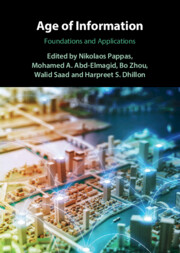Book contents
- Frontmatter
- Contents
- Contributors
- Acknowledgments
- 1 The Probability Distribution of the Age of Information
- 2 On the Distribution of AoI
- 3 Multisource Queueing Models
- 4 Controlling the Age of Information: Buffer Size, Deadlines, and Packet Management
- 5 Timely Status Updating via Packet Management in Multisource Systems
- 6 Age of Information in Source Coding
- 7 Sampling and Scheduling for Minimizing Age of Information of Multiple Sources
- 8 Age-Efficient Scheduling in Communication Networks
- 9 Age-Driven Transmission Scheduling in Wireless Networks
- 10 Age of Information and Remote Estimation
- 11 Relation between Value and Age of Information in Feedback Control
- 12 Age of Information in Practice
- 13 Reinforcement Learning for Minimizing Age of Information over Wireless Links
- 14 Information Freshness in Large-Scale Wireless Networks: A Stochastic Geometry Approach
- 15 The Age of Channel State Information
- 16 Transmission Preemption for Information Freshness Optimization
- 17 Economics of Fresh Data Trading
- 18 UAV-Assisted Status Updates
- Index
10 - Age of Information and Remote Estimation
Published online by Cambridge University Press: 02 February 2023
- Frontmatter
- Contents
- Contributors
- Acknowledgments
- 1 The Probability Distribution of the Age of Information
- 2 On the Distribution of AoI
- 3 Multisource Queueing Models
- 4 Controlling the Age of Information: Buffer Size, Deadlines, and Packet Management
- 5 Timely Status Updating via Packet Management in Multisource Systems
- 6 Age of Information in Source Coding
- 7 Sampling and Scheduling for Minimizing Age of Information of Multiple Sources
- 8 Age-Efficient Scheduling in Communication Networks
- 9 Age-Driven Transmission Scheduling in Wireless Networks
- 10 Age of Information and Remote Estimation
- 11 Relation between Value and Age of Information in Feedback Control
- 12 Age of Information in Practice
- 13 Reinforcement Learning for Minimizing Age of Information over Wireless Links
- 14 Information Freshness in Large-Scale Wireless Networks: A Stochastic Geometry Approach
- 15 The Age of Channel State Information
- 16 Transmission Preemption for Information Freshness Optimization
- 17 Economics of Fresh Data Trading
- 18 UAV-Assisted Status Updates
- Index
Summary
In this chapter, we discuss the relationship between Age of Information and signal estimation error in real-time signal sampling and reconstruction. Consider a remote estimation system, where samples of a scalar Gauss–Markov signal are taken at a source node and forwarded to a remote estimator through a channel that is modeled as a queue. The estimator reconstructs an estimate of the real-time signal value from causally received samples. The optimal sampling policy for minimizing the mean square estimation error is presented, in which a new sample is taken once the instantaneous estimation error exceeds a predetermined threshold. When the sampler has no knowledge of current and history signal values, the optimal sampling problem reduces to a problem for minimizing a nonlinear Age of Information metric. In the AoI-optimal sampling policy, a new sample is taken once the expected estimation error exceeds a threshold. The threshold can be computed by low-complexity algorithms and the insights behind these algorithms are provided. These optimal sampling results were established (i) for general service time distributions of the queueing server, (ii) for both stable and unstable scalar Gauss–Markov signals, and (iii) for sampling problems both with and without a sampling rate constraint.
- Type
- Chapter
- Information
- Age of InformationFoundations and Applications, pp. 259 - 282Publisher: Cambridge University PressPrint publication year: 2023



